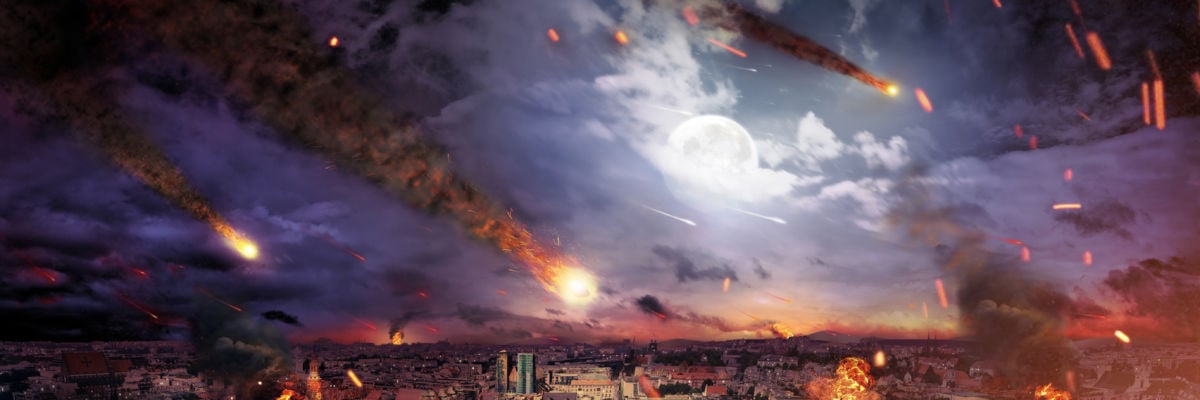
Countdown to the Kingdom is a prophecy-centered website run by Catholic authors Christine Watkins and Mark Mallett.
It anticipates the fulfillment in our day of various prophecies from public and private revelation, which it integrates into an overall scenario represented by a timeline on its website.
The scenario involves the seven seals prophecy from the book of Revelation, followed by a period called “Door of Justice—The Day of the Lord” which involves a “time of refuges,” “divine chastisements,” the “reign of antichrist,” “3 days of darkness,” followed by “the era of peace,” “the return of Satan’s influence,” and finally the Second Coming.
Christians have always found the idea compelling that the end of the world could come in their lifetimes, and they have always hungered for detailed scenarios of what dramatic events would be imminently occurring. However, all such scenarios so far have failed to materialize, so what evidence is on offer for the Countdown timeline?
The website states:
[This timeline] is based on the Early Church Fathers’ interpretation of the book of Revelation as it was handed on to them, and thus, their straight reading of chapters 19-21. This is complimented [sic] by the magisterial teachings of the popes, the approved apparitions of Fatima, and supplemented by the “prophetic consensus” of various credible seers throughout the world.
Despite these assurances, the scenario the site proposes is very uncertain and, in truth, very unlikely to unfold.
It has been built up by selecting and fitting together individual pieces of information and interpretations of them that the authors of the site find credible.
Like anything involving a large number of deductions, the chain here is no stronger than the individual links that constitute it, and detailed scenarios like this have a very high rate of failure.
When we examine the basis of the timeline, we are not given reasons for confidence. The website cites four principal sources: (1) the Church Fathers, (2) magisterial teachings of popes, (3) the apparitions at Fatima, and (4) a “prophetic consensus” of credible seers.
However, the Church Fathers did not inherit a single interpretation of the book of Revelation. There were very few commentaries written on it in the patristic period, views on the book diverged widely, and Countdown to the Kingdom has selected its preferred points of interpretation while ignoring others.
Magisterial teachings on prophecy are minimal, and the popes have not provided teachings supporting the Countdown timeline. They only provide teachings about points common to every orthodox Catholic view of prophecy (e.g., there will be a Second Coming).
Although Fatima is an approved apparition, the interpretation of it offered by the Magisterium holds that it dealt with events in the twentieth century, not events in our future.
And the “‘prophetic consensus’ of credible seers” is particularly problematic.
Current canon law allows people to publish reports of apparitions without prior review by a bishop, and today, anybody can set up a website and begin distributing them. So how are seers to be judged credible?
One standard would be relying only on those whose revelations have been investigated and approved by Church authorities, but Countdown to the Kingdom does not use this standard.
Instead, it uses those whom the authors of the site personally deem credible, which is a subjective test. The “prophetic consensus” to which they appeal is generated by that selection and piecing together things these seers say.
A concern I have not seen the authors of the website address is the extent to which the “consensus” may be produced by confirmation bias and feedback loops.
Do they find certain seers credible because they teach certain prophetic ideas and include them in the consensus due to confirmation bias?
Since many of the seers are active today, they are undoubtedly aware of the writings of previous seers and may be picking up ideas from these writings. A non-authentic seer can easily bolster his credibility by repeating and building on popular ideas from prior seers. Consequently, is there a feedback loop among their seers generating an inflated perception of consensus?
Countdown has chosen not to use Church approval as the standard for deeming seers credible. How reliable is its own evaluation?
The website does not show evidence that the authors have conducted detailed investigations of the seers they recommend or, if they have, that they properly applied critical thinking to their cases and objectively weighed the evidence.
If they had done so, they would not recommend some of the seers they rely on.
For example, they use locutions attributed to the Virgin Mary by Fr. Stephano Gobbi (1930-2011). However, Fr. Gobbi had a track record of false predictions. In 1995, he predicted that Christ would return in glory in the year 2000 to establish the new heavens and the new earth. The CDF subsequently advised that his messages “are not the words of our Blessed Mother, but his private meditations.”
Countdown’s page on Fr. Gobbi does not mention these facts and presents him as an authentic seer, without alerting its readers to serious issues affecting his credibility.
In 2020, I began receiving inquiries from people alarmed about claims made on the Countdown to the Kingdom website about events that would be occurring later that year.
To reassure these individuals, I decided to devote episodes of my podcast Jimmy Akin’s Mysterious World to “the Warning”—an event Countdown holds is supported by the “prophetic consensus”—and to the revelations of Fr. Michel Rodrigue, a Canadian priest who purports to be “the Apostle of the Last Time” and was the most promoted seer on Countdown’s site.
I contacted key individuals at Countdown to the Kingdom and asked them to review the scripts for the episodes in advance, because I wanted to make sure the scripts were absolutely accurate and fair.
Though I arrived at conclusions they wouldn’t like, the people from Countdown were nothing but professional, cooperative, and polite, and I want to give them credit.
According to Countdown to the Kingdom and other sources, “the Warning” is held to be an event in which all people will receive an illumination of conscience, allowing them to see the state of their soul. The version of this event promoted by Countdown—as described by Fr. Rodrigue—held that it would be accompanied by other phenomena, such as airplanes stopping in mid-flight for five to fifteen minutes.
I concluded that the evidence for the Warning was not strong and that the version promoted by Countdown was very unlikely.
Fr. Rodrigue also predicted that a series of dramatic, apocalyptic events—including a Third World War, the martyrdom of Pope Francis, and an ecumenical council being called by Pope Emeritus Benedict—would begin in October 2020.
I organized a team of volunteers to review Fr. Rodrigue’s extensive lectures and messages. I concluded that he is not to be relied upon as a seer, that his revelations are inauthentic, and that he appears to be a fabulist who either greatly embellishes or manufactures significant elements of his life story.
Fr. Rodrigue is incardinated in one Canadian diocese but lives in another, and while the episode was in production, both of his bishops published letters in which they repudiated the seer’s revelations. They, too, had received many inquiries from people alarmed by Fr. Rodrigue’s claims.
In a letter dated September 9, the bishop of Hearst-Moosonee wrote:
[Fr. Rodrigue’s] presentations may be found on various websites. Father Rodrigue even declared that his messages and prophecies were supported by Bishop Lemay, the Bishop of Amos, who strongly denied any such support.
In union with Bishop Lemay, I express TOTAL DISAVOWAL of the messages and prophecies presented by Father Michel Rodrigue [emphasis in original].
Despite this, Fr. Rodrigue’s talks and messages remain on the Countdown website.
The authors state, “We will as always . . . fully submit to any formal declarations the Church may pronounce in the future,” but they (implausibly) argue that the letters by Fr. Rodrigue’s bishops are not formal declarations and that his messages are “nevertheless not condemned” (emphasis in original).
In view of these facts, I consider Countdown to the Kingdom to be a website that presents a highly sensationalistic, speculative, and unlikely prophetic scenario that is put together from scattered pieces of information and interpretations that the authors favor.
I do not see the authors exercising the type of critical thinking and discernment that would lend confidence to Countdown’s conclusions.



